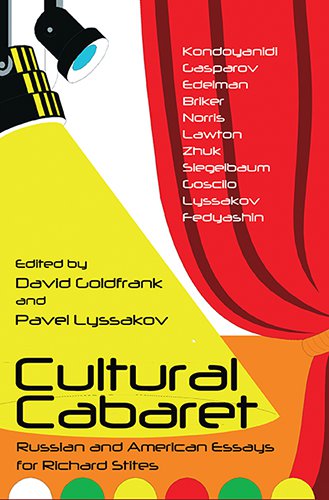
About the Author
David Goldfrank—Richard Stites’s colleague for thirty-three years—is Professor of History and Director of Medieval Studies at Georgetown University. His books include The Monastic Rule of Iosif Volotsky (1983, rev. ed., 2000), The Origins of the Crimean War (1994), A History of Russia (co-authors, Catherine Evtuhov, Lindsey Hughes, Richard Stites, 2003/4), and Nil Sorsky: The Authentic Writings (2008). His edited volumes include Passion and Perception: Essays on Russian Culture by Richard Stites (2010) and Essays in Russian Monasticism = Russian History 39.2 (2012). His current major project is a study cum translation of Iosif’s Prosvetitel’.
Pavel Lyssakov is Associate Professor, Faculty of Liberal Arts and Sciences, St. Petersburg State University (SPBGU). He graduated from SPBGU in 1986 and received a PhD in Russian Literature from Columbia University in 1998. Author of a number of articles on 19th and 20th century Russian Literature and editor of Cultural Studies (Kul’tural’nye issledovaniia, 2006, co-editor, Alexander Etkind), his research interests are Nikolai Gogol, Russian Modernist fiction, film, and mass media.
CULTURAL CABARET: Russian and American Essays for Richard Stites
David Goldfrank and Pavel Lyssakov, eds.New Academia Publishing, 2012
284 Pages, 84 Illustrations
ISBN 978-0-9855698-9-1 Paperback
For BULK ORDERS, order directly from New Academia Publishing.
Queries: orders@newacademia.com
About the Author
David Goldfrank—Richard Stites’s colleague for thirty-three years—is Professor of History and Director of Medieval Studies at Georgetown University. His books include The Monastic Rule of Iosif Volotsky (1983, rev. ed., 2000), The Origins of the Crimean War (1994), A History of Russia (co-authors, Catherine Evtuhov, Lindsey Hughes, Richard Stites, 2003/4), and Nil Sorsky: The Authentic Writings (2008). His edited volumes include Passion and Perception: Essays on Russian Culture by Richard Stites (2010) and Essays in Russian Monasticism = Russian History 39.2 (2012). His current major project is a study cum translation of Iosif’s Prosvetitel’.
Pavel Lyssakov is Associate Professor, Faculty of Liberal Arts and Sciences, St. Petersburg State University (SPBGU). He graduated from SPBGU in 1986 and received a PhD in Russian Literature from Columbia University in 1998. Author of a number of articles on 19th and 20th century Russian Literature and editor of Cultural Studies (Kul’tural’nye issledovaniia, 2006, co-editor, Alexander Etkind), his research interests are Nikolai Gogol, Russian Modernist fiction, film, and mass media.
About the book
A singular mix of Russian and American academia presents this cultural cabaret in Richard Stites’s memory. Topics include: theater, linguistics, soccer, jokes, cartoons, film, cars, tattoos, and Reality TV.
Richard Stites devoted his remarkable talents, energy, and discipline to studying and writing about Russian culture, both highbrow and popular, and his pioneering efforts affected the intellectual landscape in both American and post-Soviet space.
And so a singular mix of Russian and American academia presents this cultural cabaret in Richard’s memory and honor: a pioneering feminist male writer; Eurasianism’s influence on the development of linguistics; pre-World War II Moscow soccer and its fans; the contextual dynamics of a mid-1930’s anti-Stalin joke; the conflicted, 108-year life of a legendary Soviet cartoonist; the imagined story behind the banning of a realistic, female-directed film; an exposition and explanation of Richard’s own impact; the paradox of late Soviet private automobile consumption; the counter-cultural semiotics of criminal tattoos; the banal, profitable world of XXI-century Reality TV; and an eloquent closing tribute.





 Coming Soon
Coming Soon Awards
Awards